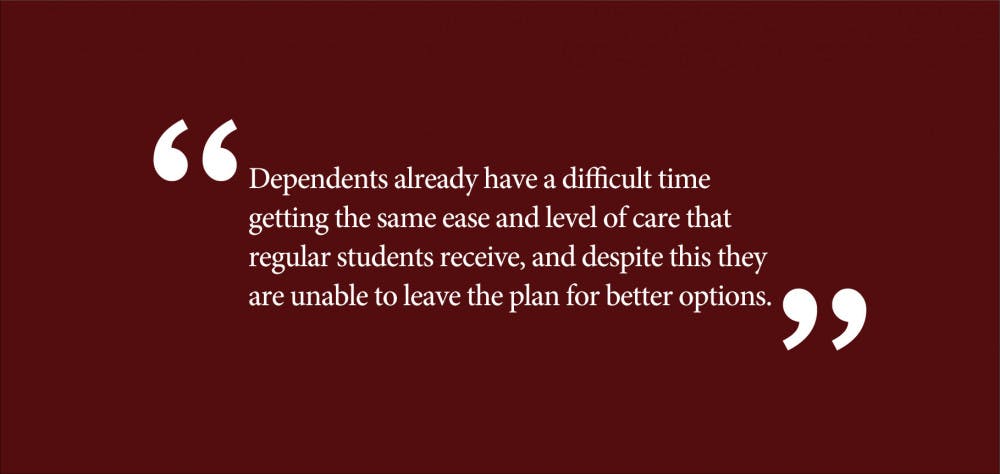Brown students are required to have health insurance, which is provided by default through the University’s Student Health Insurance Plan. Although graduate students often are older, have their own families, conduct research and teach for the University, they do not have access to the three plans offered to University employees, but are offered the same Student Health Insurance Plan instead. Combined with efforts from Health Services, the overall health care provided to those on the student insurance plan is generally fairly good. But it fails dependents on the Student Health Insurance plan — children, spouses and partners.
According to a Stand Up for Graduate Student Employees statement, the University has agreed to pay for 50 percent of dependent health insurance coverage. This is a step in the right direction, but does not address vital issues — like the lack of local health care options, or the fact that dependents cannot unenroll mid-year. Brown should re-evaluate how its health insurance helps care for them.
Dependents receive different health care at Brown. Health Services provide students with a number of different health-related services beyond just easy-to-make doctor’s appointments. Through the plan, students have access to free flu shots, a pharmacy that can contact their doctor for renewals, easy-to-reach nursing staff who can provide guidance and doctor’s notes, etc. But these services are only available to Brown students, not dependents on the Brown Student Health Insurance Plan. This means that dependents have to seek out such services elsewhere. While it may not be difficult to find another location to get a flu shot, it does mean that one family will have to manage at least two different plans for health care, which can be complex, time-consuming and expensive.
More than that, when forced to look outside of Brown Health Services for care, dependents can struggle to find options in the community that accept Brown’s health insurance. My spouse has reached out to multiple local practices, only to be turned away by those that bother to respond. Having encountered such difficulty, I reached out to the graduate student email bulletin board for recommendations of practices that would accept Brown’s insurance plan, only to find that other graduate students with dependents have experienced the same problem. If dependents cannot utilize Health Services, they must have other options in the local community.
The most difficult part of navigating Brown health insurance for a dependent, however, is leaving it. After enrolling a dependent, there is no way to terminate their coverage for the year unless the “student loses eligibility.” This information is presented in the online FAQ from Gallagher Student Health, the insurance plan’s broker, but is nowhere to be found on the University’s own health insurance information page. While the Gallagher website outlines the numerous qualifying events that would allow a student to terminate their own coverage, or even permit them to enroll in Brown health insurance during the middle of the year, dependents are not granted as much leniency.
Allowing for changes in enrollment is an important and necessary part of insurance plans. My spouse recently found employment that offered him health insurance as a benefit — a standard practice among employers. With this life change of finding a new job, he should be able to unenroll from his current plan. Yet the Brown health insurance plan does not allow him to do so. Accounting for these qualifying events should be a necessary part of health insurance, and has always been incorporated into every other health insurance plan I’ve seen.
Being unable to unenroll dependents due to qualifying life events presents some distinct financial issues. As of now, I’ve spent more than $600 that I can ill-afford paying for my spouse’s second health insurance plan — a plan on which he has been able to receive little care. I’ll continue to pay for this extraneous plan until the beginning of the next school year, so by September I’ll have handed over $2,000 for this un-cancellable insurance. I asked a Gallagher representative for help, and they told me that I signed the contract so their hands were tied. I then called an insurance and purchasing services specialist for the Brown insurance plan, who left me an unsympathetic message suggesting I just not pay for my spouse’s plan. Left with no other options, I attempted to follow her advice, yet Gallagher requires automatic payments hooked up not to a credit or debit card, but directly to my bank account. Dependents already have a difficult time getting the same ease and level of care that regular students receive, and despite this they are unable to leave the plan for better options, costing potentially thousands of dollars for subpar care.
Brown needs to address these problems with dependent care under the health insurance plan that they offer their students. If it’s impossible to include dependents in on-campus health services, working with the community to find good options for dependents is necessary. More than that, those in charge of designing and implementing Brown student health insurance should revisit their policy of not allowing dependents to unenroll. Qualifying events should extend to dependents as well, offering them the standard opportunities for modifying their insurance and, therefore, health care. At the very least, Brown should work to make very clear the unusual characteristics of health insurance enrollment for dependents, so that others do not needlessly find themselves in my situation.
E.L. Meszaros GS can be reached at e.l.meszaros@brown.edu. Please send responses to this opinion to letters@browndailyherald.com and op-eds to opinions@browndailyherald.com.





